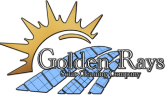Solar Quotes: Key Factors That Affect Your Solar Panel Costs
.webp)
Solar energy is one of the most rapidly developing renewable energy sources, offering a long-term solution to rising energy costs. While converting to solar energy might result in significant long-term savings, the upfront cost is frequently a top priority for homeowners. Solar panel quotes can vary greatly depending on several crucial aspects. Understanding these aspects will allow you to make an informed selection and maximize your investment. With insights from Golden Rays Solar Cleaning Company, this article will delve into the fundamental factors of solar panel costs, covering everything from installation size to government subsidies.
Size of the Solar System
Why Size Matters
The size of the system is a significant element in determining solar panel costs. Your energy requirements and the available installation space will determine the size of the solar array. Larger systems with more panels will always cost more, but they can generate more power, resulting in more significant energy savings.
Calculating the Right Size
When choosing the appropriate system size, consider your average monthly kilowatt-hours (kWh) usage. An commercial solar panel installation or specialist, such as Golden Rays Solar Cleaning Company, can help you examine your energy requirements and recommend a system that fulfills your needs while staying within your budget.
Type of Solar Panels
Types of Panels Available
There are three types of solar panels:
- Monocrystalline
- Polycrystalline
- Thin-film
Each variety differs in efficiency, durability, and cost.
Monocrystalline Panels
Monocrystalline panels are more expensive than others due to their efficiency and longevity.
Polycrystalline Panels
They are less efficient than monocrystalline but more inexpensive, making them ideal for homeowners on a tighter budget.
Thin-Film Panels
These are the least efficient but lightweight and flexible, making them excellent for specific uses.
Choosing the Right Panel for Your Needs
The panel type you choose impacts upfront costs, energy output, and space efficiency. Monocrystalline panels, for example, could be suitable if you have limited roof space and require excellent efficiency.
.webp)
Quality of Equipment and Warranties
Importance of High-Quality Equipment
The quality of solar equipment, such as the inverter and mounting hardware, influences the system's longevity and performance. Investing in high-quality components may increase initial prices, but it usually leads to improved efficiency and lower maintenance costs.
Warranties and Long-Term Savings
Warranties protect your investment by covering any necessary repairs or replacements. A standard solar panel warranty is from 10 to 25 years, and Golden Rays Solar Cleaning Company recommends choosing equipment with comprehensive warranties to assure the longevity of your system and prevent unexpected costs.
Installation Costs
Labor and Expertise
The cost of labor is another important factor in your solar price. Installation costs vary depending on the complexity of the installation, the type of roof, and the installer's experience. Working with a renowned and skilled commercial solar installer, such as those at Golden Rays Solar Cleaning Company, assures a high-quality installation and reduces the possibility of future complications.
Roof Characteristics
Commercial solar roofing is becoming increasingly popular among businesses seeking to decrease energy costs and promote sustainability by harnessing the sun's power. Your roof's age, material, and slope affect installation costs. Steep roofs may require extra effort, whereas older roofs may require repairs before installing solar panels.
.webp)
Location and Sunlight Availability
Geographic Impact on Solar Efficiency
Your location significantly impacts the effectiveness of your solar system. Areas with significant sunshine exposure produce more energy, helping you recover installation expenses faster. Some states have higher average solar prices because of labor rates and materials differences.
Weather Conditions
Weather patterns, shadowing, and seasonal variations can all impact how well your solar panels operate. Heavy cloud cover may necessitate a more extensive system or more efficient panels to generate sufficient electricity, raising overall costs.
Government Incentives and Deductions
Federal and State Incentives
Government incentives can dramatically lower the cost of solar installations. The federal Investment Tax Credit (ITC) provides a percentage-based cost reduction, and many states offer extra rebates, tax credits, or performance-based incentives to reduce the overall price further.
Solar Renewable Energy Credits (SRECs)
In some states, homeowners can get Solar Renewable Energy Credits for the energy produced by their solar system. These credits can eventually be sold to commercial solar power companies, providing an additional source of revenue to assist in covering installation expenses.
.webp)
Energy Storage and Battery Options
Why Add Energy Storage?
Adding a battery storage system to your solar system provides backup power during outages and increases energy independence. Batteries enable you to store extra energy produced during the day for later usage at night or peak electricity rates.
Battery Costs and Benefits
While installing storage raises initial expenses, it might be a worthwhile investment for individuals who experience frequent power outages or high peak electricity bills. Over time, battery storage can reduce total electricity costs and improve the durability of your solar system.
Maintenance and Cleaning
Importance of Regular Maintenance
Keeping your solar panels clean and well-maintained ensures maximum performance and energy output. Dust, debris, and bird droppings can diminish efficiency. Thus, regular solar clean or solar panel bird proofing is necessary for long-term savings.
Professional Cleaning Services
Golden Rays is a commercial solar company that provide a professional solar panel cleaning service to help homeowners maintain the effectiveness of their solar systems. Regular maintenance improves energy production and prevents expensive repairs, protecting your investment.
.webp)
Solar Power FAQ
How much does an average solar panel system cost?
The average home solar system costs between $15,000 and $25,000 before subsidies, depending on system size, panel type, and installation difficulty.
Are solar panels worth investing in areas with less sunlight?
Even in locations with less sunlight, solar panels can provide enough electricity to cover expenditures. High-efficiency panels or larger systems may be required, but incentives and energy bill savings can make solar an attractive option.
What maintenance is required for solar panels?
Commercial solar panels require little care, only cleaning and occasional inspections. Dust and dirt can build up on panels, slightly lowering efficiency. Professional services like those provided by Golden Rays Solar Cleaning Company can help keep your panels in top condition.
How to compare solar quotes?
To compare solar panel quotes effectively, make sure to evaluate the cost per watt, installation fees, warranty terms, and the reputation of the installer before making your decision.
Conclusion
Investing in solar panels is essential for energy independence and environmental sustainability. Requesting a solar installation quotation allows homeowners to assess the costs, available incentives, and the potential energy savings from installing solar panels on their property. By consulting with professionals like Golden Rays Solar Cleaning Company, you can confidently manage these elements and get the most out of your solar installation.
Do you need some help?
The Only Solar Company you'll Ever Need! Speak with our Experts Today!
As local solar panel cleaning experts, Golden Rays Solar Panel Cleaning, Bird Proofing & Installation Services takes pride in being the go-to solar panel cleaner for homeowners and businesses across the Central Valley.

.png)









